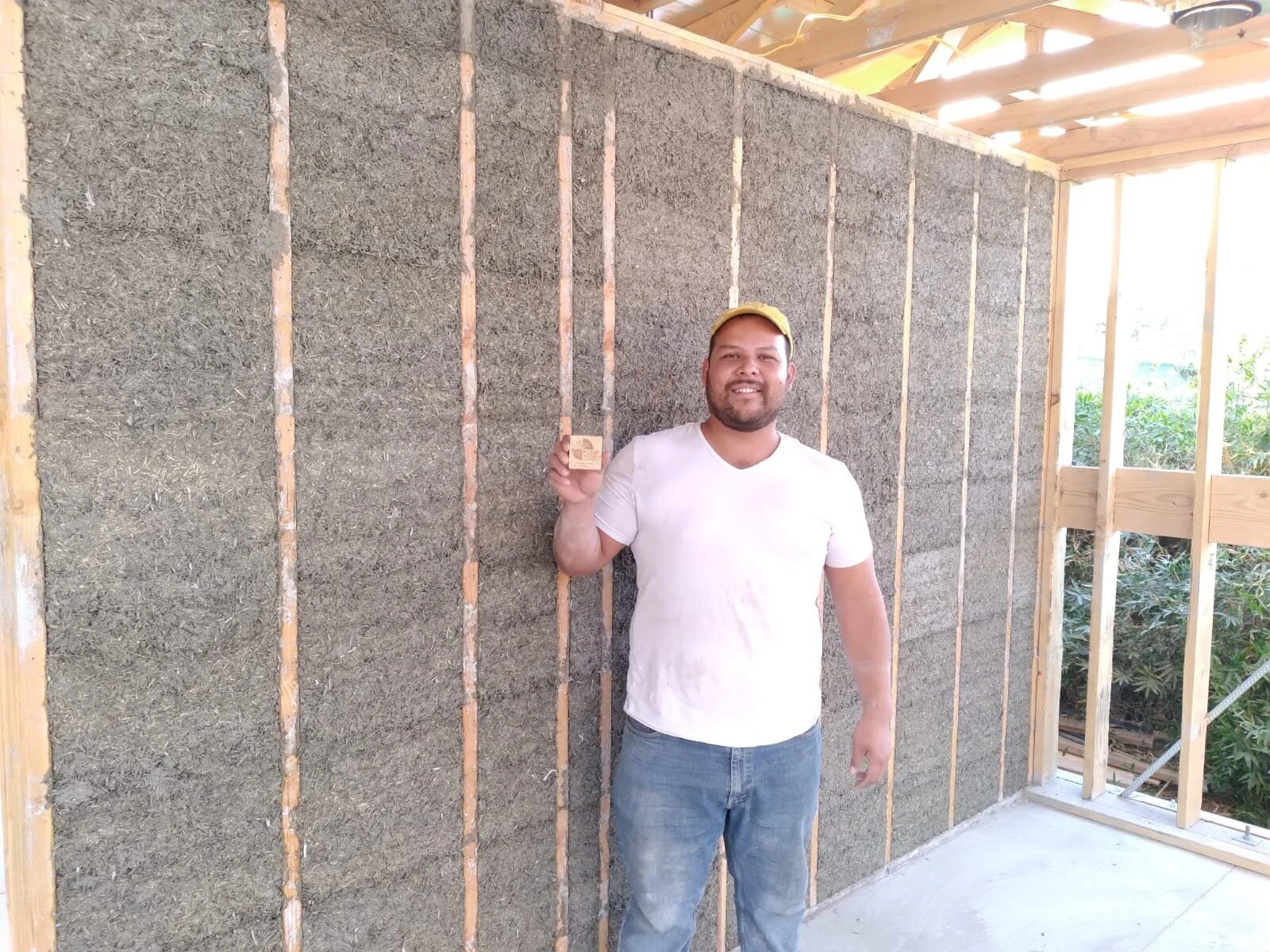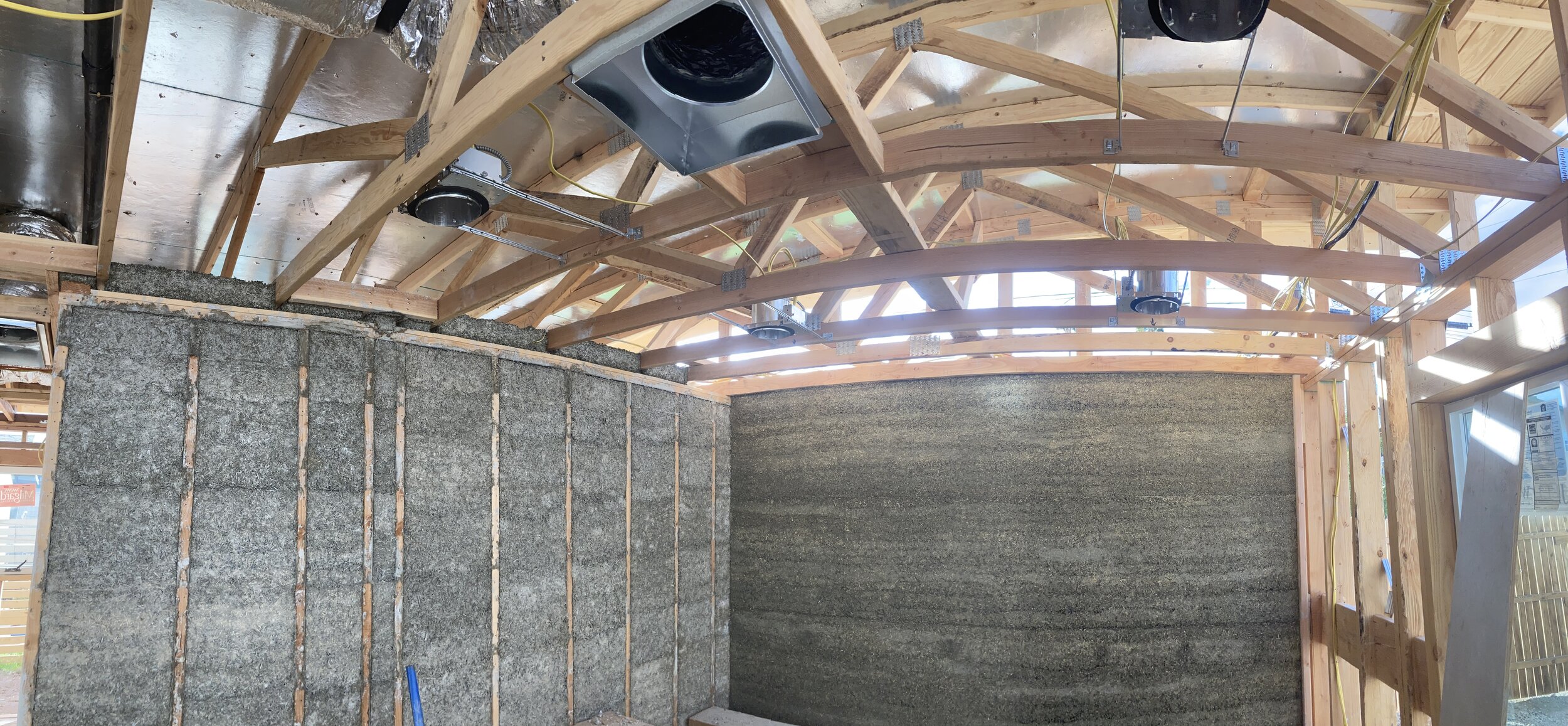California’s ADU Movement: Hemp Building's Moment?
By Jean Lotus
A movement to create low-cost mini-housing in the state of California may be the golden opportunity hemp building needs to enter the public consciousness, one builder and startup founder believes.
In a state with 3.5 million fewer affordable housing units than it needs, California’s legislature in 2020 passed a new state law promoting 1.5 million accessory dwelling units, (ADUs) or “granny flats” to be constructed on private property. The new rules encourage more attainable housing with the least amount of taxpayer expense. The laws remove barriers such as zoning delays, local housing density covenants and parking restrictions.
Subscribe to HempBuild Magazine’s free newsletter
For Chris Veslasco, 33, hempcrete was a natural choice for the 750-sq. ft ADU he’s building on family property in Calexico, near the Mexican border. The San Diego-based urban planner and startup founder researched hemp+lime insulation for the walls of his two-bedroom mini-dwelling because of its climate-regulating properties.
“The Imperial Valley can get up to 120 degrees in the summer and it’s pretty cold in the winter,” Velasco told HempBuildMag.com. The more Velasco learned about hempcrete -- that it was fireproof, pestproof, mold-proof and sustainable -- the more he recognized hemp and lime insulation was a “climate resilient material,” he said.
“The building industry hasn’t really progressed in a long time in terms of actual better materials,” Velasco said. “We’re still using gypsums and petroleum products derived from the extraction process that create a lot of chemicals and vapors that come off new homes.”
Hempcrete seemed to be a material of the future that met California’s climate goals.
It’s also saving Velasco money. The average detached ADU costs about $200,000 to construct, and Velasco says he’s budgeting about $100,00 for his ADU, a significant savings.
It would have cost even less if Velasco had been able to source the hemp hurd and lime locally, he said. Velasco trucked in American-grown hemp hurd from North Carolina and imported lime binder from Europe for the project.
The new unit will have a kitchen, bath and laundry facilities. Velasco worked with Nicholas Holmes, a natural building contractor based out of Joshua Tree, to install the hand-cast hempcrete walls.
Permitting the project was difficult but not impossible, Velasco said.
As a consultant who helps municipalities with building codes, Velasco was able to work “on both ends of the counter” with the local building permitting department and point to alternative sustainable materials in California’s Green Building Standards Code.
Success in the last decade of straw-bale construction helped Velasco explain hemp+lime to local permitting agents. He also included seismic structural reinforcement for the house frame in a location a few miles from the San Andreas fault.
Velasco’s company, Dotek, LLC, believes the ADU movement in California is a revolution that can add extra housing on a statewide basis. Hemp construction could be a significant part of that trend, he said.
Valesco also said even more efficiencies can be added to hemp-based construction, including prefabricating small granny-flats from hemp.
“I’m a big proponent of modular, that’s how you reduce the time and cost, and you avoid 1,000 building inspections,” he said.
Velasco, who studied sustainable agriculture and water use at Columbia University in New York, also knows that growing hemp locally in the Imperial Valley, which has two growing seasons, would also drive costs down, as would building parts of hemp ADUs in Mexico.
The average affordable housing unit in California cost $425,000 to build in 2016 and has only increased in costs since then, largely because of permitting fees and delays.
The California’s Department of Housing and Community Development has tried to break the log jam, by encouraging ADUs.
More than a dozen new grant programs and incentives for ADU building in municipalities and counties went into effect Jan. 1, 2021.
On March 5, Los Angeles Mayor Eric Garcetti announced a new plan to speed up ADU construction in L.A., with 20 pre-approved ADU designs.
“This program is about making ADUs more accessible, more affordable, and more beautiful,” Garcetti said in a statement. ADUs are “part of the blueprint of our efforts to tackle our housing crunch and create more affordable communities citywide,” he added.
The new Los Angeles ADU approved plans reduce the plan-check review process from four to six weeks to “as little as one day,” the mayor’s office said. Other California cities and counties, like Clovis, Del Mar, Stockton, Santa Cruz and others have also released pre-approved ADU designs.
“New housing legislation has paved the way to reduce the amount of red tape to do an ADU,” Velasco said. “Not everyone wants to live in a single family home with a unit. But there are plenty of people who want to buy duplexes and triplexes,” he added.
Click here to go to our FREE online community.
Building ADUs in Los Angeles with hempcrete would be the biggest win, Velasco believes.
“If you can get it approved in L.A., it’ll be approved everywhere.”
Velasco thinks building California’s ADUs with hempcrete could also raise the profile of hemp building among contractors, developers and home buyers. That would give the U.S. construction industry a chance to kick the tires on hemp building materials in smaller projects, Velasco believes.
Hemp+lime construction has a long way to go in the United States before it’s used to build department stores and multiunit apartments as it is in Europe, but ADU construction may bring hemp into the limelight, Valasco said.
“I want my project to be a template for more hempcrete ADUs in California,” Velasco said.
Jean Lotus is editor and publisher of HempBuild Magazine. jeanlotus@hempbuildmag.com
Please Support Our Classified Advertisers
(To find out more about advertising CLICK HERE).




